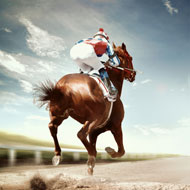
Updates include modification to veterinary treatment
The FEI has announced a series of updates to its regulations for Official Veterinarians (OVs). The updates will come into effect on 1 January 2018 and include clarification regarding the use of supportive therapies at FEI events.
Among the modifications is an update to veterinary treatment. The 2018 guidelines stipulate that horses can no longer be vaccinated prior to competition on the day in which they compete.
‘Horses can still be treated at events after they have competed, the guidelines state. ‘An exception to the regulation will be granted for classes starting at 1800hrs or later.’
The guidelines also provide classification regarding the use of equine therapists and supportive therapies, both of which have been categorised into Non-Restricted and Restricted Therapies. A new category of personnel known as ‘Permitted Equine Therapists’ will be permitted to carry out restricted therapies in which they are trained and must work under the supervision of a PTV.
The FEI adds that an online registration system is currently under development and that its OVs will receive further communication regarding this in the coming months. Due to the time needed to develop the system, the status of Permitted Equine Therapists will be regulated from 1 July 2018.
Under the new regulations, horses will not be permitted to wear bandages, blankets or rugs and must not be presented with their identity concealed. Minor changes have also be made to the minimum requirements for stabling facilities, veterinary services and equipment requirements.
The 2018 Veterinary Regulations have been approved by the FEI’s General Assembly and are available to download from the FEI website.



 The Federation of Independent Veterinary Practices (FIVP) has announced a third season of its podcast, Practice Matters.
The Federation of Independent Veterinary Practices (FIVP) has announced a third season of its podcast, Practice Matters.